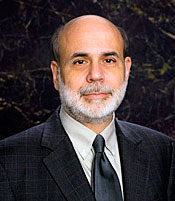Ben Bernanke has handed the reins of the Federal Reserve Bank off to Janet Yellen; as the Fed chairman for the past 8 years, we felt it’d be a good time to reflect on his time in the role.
Road to the Chair
Bernanke’s background in economics was purely academic prior to his appointments at the central bank. His time as a professor at Stanford, NYU, and Princeton gained him the notice of the Federal Reserve. In 2002 he was appointed to the Fed’s Board of Governors, where he severed until 2005. In June of 05, Bush 43 named him Chair of his Council of Economic Advisors, a role that many considered him being groomed to replace Greenspan after his eventual departure. Sure enough, in February of 2006, Bernanke was named the 14th Chairman of the Federal Reserve in an initial 4 year appointment. His background didn’t inspire confidence from some, yet his response to these early critics was well reasoned, “I was criticized for taking the job without having been working on Wall Street…My interest is solely for the strength and recovery of the U.S. economy.”
Major Events and Crises
As anybody reading this blog knows, 2008 saw the greatest recession since the Great Depression. While many debate the policy choices made by Bernanke, the majority agree that his actions prevented what could have been a much more drastic recession. These recovery policies are the largest point of contention and criticism of his time at the Fed, due to the gravity, scale, and perceived “unfairness” of several decisions. The bank bail out and reinforcement of the “too big to fail” mentality is continually brought up in discussions of his term, with the AIG bailout highlighting this issue. Reports of warnings from his staff against approving the bailout came forward and many questioned whether the bailout was necessary for the recovery. Senators from both sides came out in support of Bernanke’s policies following this criticism, including then Presidential candidates Obama and McCain.
Legacy
Needless to say, Bernanke’s time at the Fed will be used as an example of how to handle future recessions. Whether it’s a warning of what not to do or a template to follow remains to be seen with an anemic recovery. Staving off a full scale depression is nothing to scoff at however, so policies such as the quantitative easing and keeping interest rates at historic lows will most likely be emulated and built upon moving forward.

